#Mohamed Hamdan Dagalo
Text
#cnn#us news#united states news#us news source#sudan#united nations#the united nations#humanitarian aid#humanitarian crisis#food insecurity#gender based violence#Mohamed Hamdan Dagalo#Abdel Fattah al-Burhan#ethnic cleansing#east africa
5 notes
·
View notes
Text
The head of the paramilitary Rapid Support Forces (RSF) has proposed a plan for “lasting peace” in war-torn Sudan as his rival army chief promised victory and no chance of a deal with “traitors”.
Mohamed Hamdan “Hemedti” Dagalo, the head of the RSF, late Sunday published a 10-point plan by the paramilitary group that proposes new negotiations to end a war that began in mid-April, a war he claimed the RSF “did not seek, nor initiate”.
“Efforts to end the protracted crisis must be directed toward achieving a lasting ceasefire, coupled with comprehensive political solutions that address the root cause of Sudan’s wars,” his statement said.
Hemedti floated the idea of a “non-symmetrical federal system” that would represent Sudan’s regional, cultural and ethnic diversity after elections to form a civilian government and end “structural violence” against broad segments of Sudanese citizens.
Crucially, he proposed a new, apolitical and unified Sudanese army built from merging existing forces that would have civilian oversight and conform to internationally recognised foundations.
But the general’s proposals, which are titled Sudan Reborn and appear to be in line with international calls for shaping the country’s future, hardly correspond with the realities on the ground as the devastating war enters its 20th week.
For one, war broke out between the RSF and the Sudanese army shortly before the paramilitary force was supposed to be integrated into the army, which is led by General Abdel Fattah al-Burhan, as part of a plan to restore civilian rule.
The two generals had staged a coup in 2021 that pushed civilian politicians out of the government, which itself came two years after they banded together to end the reign of military commander Omar al-Bashir over Sudan.
On the other hand, Hemedti and the RSF have been documented by the United Nations and prominent human rights organisations and activists to have committed ethnic cleansing as well as systemic sexual violence.
In the western region of Darfur, which was the scene of a genocidal war in the early 2000s involving forces that later evolved into the RSF, there have been widespread reports of killing African community members and rape since the start of the war.
The International Criminal Court has also said it is investigating new war crimes and crimes against humanity in Darfur as the UN has warned that the war “now threatens to consume the entire country”.
More than 4.6 million people have been forced to flee their homes since the start of the war, according to UN figures that say more than one million have fled to neighbouring countries, including Chad and Egypt.
Al-Burhan denounces RSF
In a speech on Monday, al-Burhan denounced the RSF as “traitors” and promised a decisive victory in a speech to soldiers, rejecting calls for a ceasefire.
“We do not make deals with traitors, we do not make deals with anyone who has betrayed the Sudanese people,” al-Burhan told cheering soldiers at the Flamingo Base in Port Sudan on the Red Sea.
Al-Burhan has embarked on a tour of bases in army-controlled regions and is expected to travel to Saudi Arabia and Egypt, prompting some to speculate that a deal was imminent.
“We are dedicating all our time to this war … to ending this rebellion,” al-Burhan said, promising a quick and decisive victory, echoing previous statements from the military leadership.
The RSF “are completely exhausted – just a little effort and they will be finished,” he said.
On Thursday, he had made an appearance outside the army’s general command centre in the capital, Khartoum, for the first time since the war began.
On Sunday, he appeared in Port Sudan, to the northeast of the country, which has been spared the worst of the fighting.
Many ceasefires in Sudan have been repeatedly violated, often immediately after coming into effect, with the two sides blaming each other for undermining the ceasefires.
Riyadh and Washington have for now stopped their mediation efforts as the two sides continue to grapple for military dominance before seriously committing to a long-term peace plan.
0 notes
Text
Israel Says It Should Mediate Peace in Sudan, the Sudanese People Disagree
Israel has offered to mediate the conflict raging in Sudan. This piece at Mondoweiss explains its interest, why Sudan finally and fully joining the Abraham Accords is so important to Israel, and how this whole episode is about sidelining the will of the Sudanese people, both in their fight for democracy and their solidarity with the Palestinians.

View On WordPress
#Abdalla Hamdok#Abdel-Fattah Al-Burhan#Abraham Accords#al-Qaeda#Benjamin Netanyahu#Donald Trump#Hemedti#Hosni Mubarak#Joe Biden#Khartoum#Libya#Mohamed Hamdan Dagalo#Mohammed Morsi#Omar al-Bashir#Osama Bin Laden#Palestinians#Rapid Support Forces#Sudan#Three No&039;s#United Arab Emirates
0 notes
Text
Orphanage Under Siege
Orphanage Caught Between Civil War
An orphanage is caught between warring factions in the capital of Sudan, and more than sixty children have died inside as help has been unable to reach them.
The Al-Mayqoma orphanage in Khartoum, Sudan, is surrounded by homes, markets, and little shops. But since mid-April, it has been at the epicenter of a warzone. The Sudanese military, led by General Abdel-Fattah Burhan, are fighting the…

View On WordPress
0 notes
Text
0 notes
Text
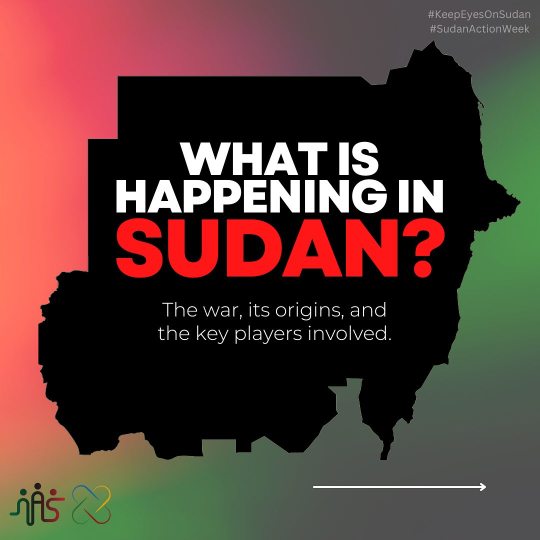
Via NasAlSudan
December 17 2023. #KeepEyesOnSudan #SudanActionWeek
Swipe through to build a foundational understanding of the war, its origins, and the key players involved. For actionable ways to support those in Sudan, check the link in our bio. Stay tuned for more posts this week.
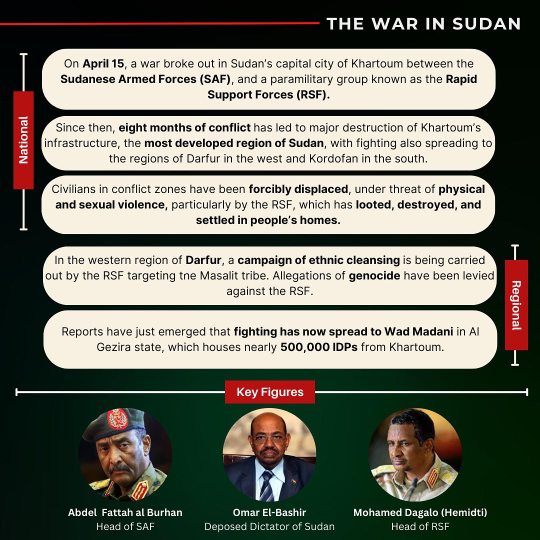
Transcript:
National:
On April 15, a war broke out in Sudan's capital city of Khartoum between the Sudanese Armed Forces (SAF), and a paramilitary group known as the Rapid Support Forces (RSF).
Since then, eight months of conflict has led to major destruction of Khartoum's infrastructure, the most developed region of Sudan, with fighting also spreading to the regions of Darfur in the west and Kordofan in the south.
Civilians in conflict zones have been forcibly displaced, under threat of physical and sexual violence, particularly by the RSF, which has looted, destroyed, and settled in people's homes.
Regional:
In the western region of Darfur, a campaign of ethnic cleansing is being carried out by the RSF targeting the Masalit tribe. Allegations of genocide have been levied against the RSF.
Reports have just emerged that fighting has now spread to Wad Madani in Al Gezira state, which houses nearly 500,000 IDPs from Khartoum.
Key figures:
Abdel Fattah al Burhan Head of SAF
Omar El-Bashir Deposed Dictator of Sudan
Mohamed Dagalo (Hemidti) Head of RSF
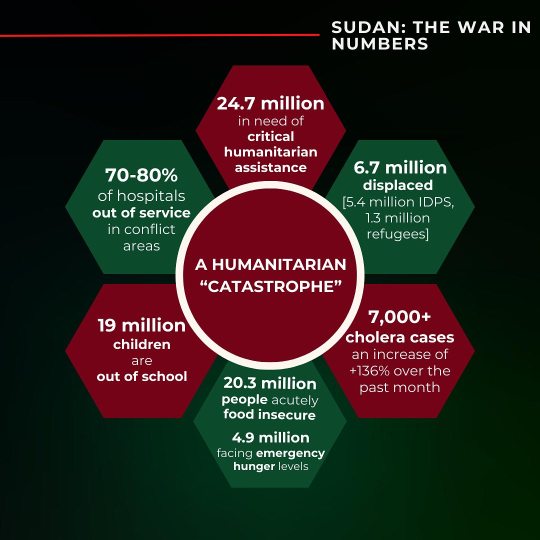
Transcript:
Sudan: the war in numbers
A humanitarian "catastrophe"
24.7 million in need of critical humanitarian assistance
70-80% of hospitals out of service in conflict areas
19 million children are out of school
20.3 million people acutely food insecure. 4.9 million facing emergency hunger levels
6.7 million displaced [5.4 million IDPS, 1.3 million refugees]
7,000+ cholera cases an increase of +136% over the past month
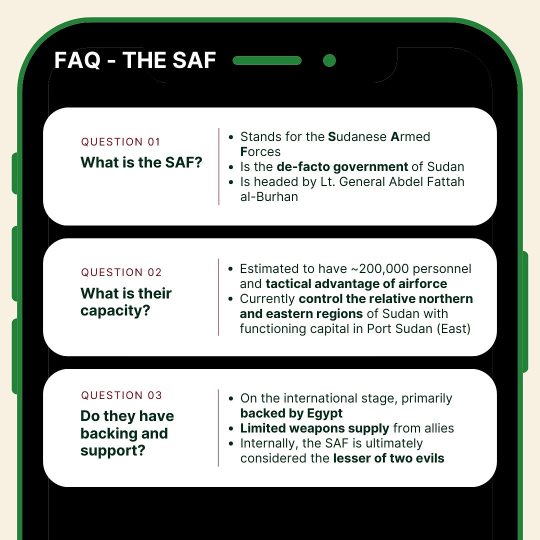
Transcript:
FAQ - THE SAF
QUESTION 01: What is the SAF?
Stands for the Sudanese Armed Forces
Is the de-facto government of Sudan
Is headed by Lt. General Abdel Fattah al-Burhan
QUESTION 02 What is their capacity?
Estimated to have ~200,000 personnel and tactical advantage of airforce
Currently control the relative northern and eastern regions of Sudan with functioning capital in Port Sudan (East)
QUESTION 03 Do they have backing and support?
On the international stage, primarily backed by Egypt
Limited weapons supply from allies
Internally, the SAF is ultimately considered the lesser of two evils
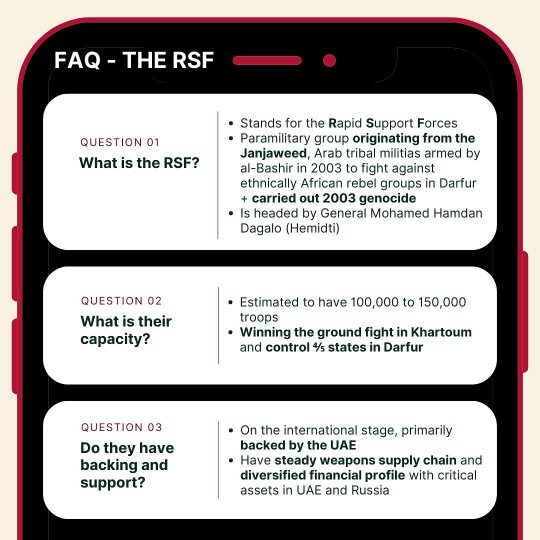
Transcript:
FAQ - THE RSF
QUESTION 01 What is the RSF?
Stands for the Rapid Support Forces
Paramilitary group originating from the Janjaweed, Arab tribal militias armed by al-Bashir in 2003 to fight against ethnically African rebel groups in Darfur + carried out 2003 genocide
Is headed by General Mohamed Hamdan Dagalo (Hemidti)
QUESTION 02 What is their capacity?
Estimated to have 100,000 to 150,000 troops
Winning the ground fight in Khartoum and control 4/5 states in Darfur
QUESTION 03 Do they have backing and support?
On the international stage, primarily backed by the UAE
Have steady weapons supply chain and diversified financial profile with critical assets in UAE and Russia
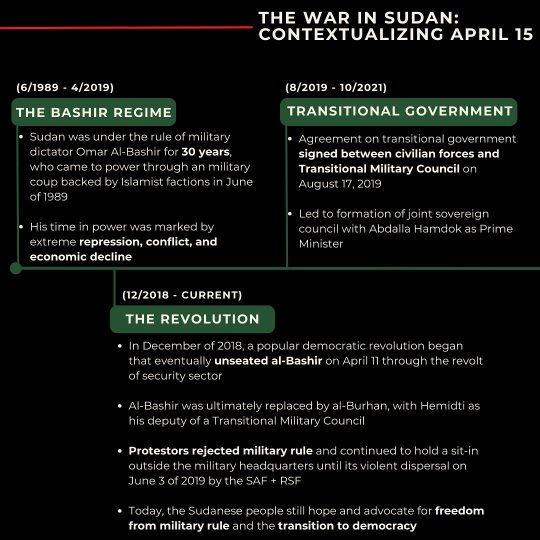
Transcript:
THE WAR IN SUDAN: CONTEXTUALIZING APRIL 15
(6/1989 - 4/2019) THE BASHIR REGIME
Sudan was under the rule of military dictator Omar Al-Bashir for 30 years, who came to power through an military coup backed by Islamist factions in June of 1989
His time in power was marked by extreme repression, conflict, and economic decline
(12/2018 CURRENT) THE REVOLUTION
In December of 2018, a popular democratic revolution began that eventually unseated al-Bashir on April 11 through the revolt of security sector
Al-Bashir was ultimately replaced by al-Burhan, with Hemidti as his deputy of a Transitional Military Council
Protestors rejected military rule and continued to hold a sit-in outside the military headquarters until its violent dispersal on June 3 of 2019 by the SAF + RSF
Today, the Sudanese people still hope and advocate for freedom from military rule and the transition to democracy
(8/2019-10/2021) TRANSITIONAL GOVERNMENT
Agreement on transitional government signed between civilian forces and Transitional Military Council on August 17, 2019
Led to formation of joint sovereign council with Abdalla Hamdok as Prime Minister
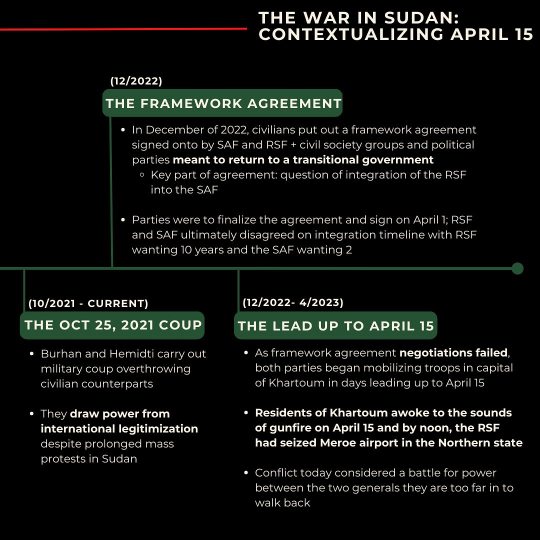
Transcript:
(10/2021 CURRENT)THE OCT 25, 2021 COUP
Burhan and Hemidti carry out military coup overthrowing civilian counterparts
They draw power from international legitimization despite prolonged mass protests in Sudan
(12/2022) THE FRAMEWORK AGREEMENT
In December of 2022, civilians put out a framework agreement signed onto by SAF and RSF + civil society groups and political parties meant to return to a transitional government
Key part of agreement: question of integration of the RSF into the SAF
Parties were to finalize the agreement and sign on April 1; RSF and SAF ultimately disagreed on integration timeline with RSF wanting 10 years and the SAF wanting 2
(12/2022-4/2023) THE LEAD UP TO APRIL 15
As framework agreement negotiations failed, both parties began mobilizing troops in capital of Khartoum in days leading up to April 15
Residents of Khartoum awoke to the sounds of gunfire on April 15 and by noon, the RSF had seized Meroe airport in the Northern state
Conflict today considered a battle for power between the two generals they are too far in to walk back

Transcript:
FRAMING ALLIANCES
Sudanese Armed Forces (SAF):
Egypt
Israel (Foreign Ministry)
Islamists
Iran
Saudi Arabia
Ukraine (SOF)
Armed Groups
Rebel groups that had taken up arms against the central government in the Bashir Era are forced to ally with the SAF due to the RSF's ethnic cleansing campaign. They include:
Justice and Equality Movement (Gibril Ibrahim)
Sudan Liberation Movement/Army (Minni Minawi)
Gathering of Sudan Liberation Forces (Abdallah Yahya)
Rapid Support Forces (RSF):
Israel (Mossad)
Libya (Khalifa Haftar)
United Arab Emirates
Central African Republic
Russia (Wagner Group)
Chad
Arab Tribal Leaders
Arab tribal leaders across the Western region of Darfur have pledged their allegiance and support to the RSF, with members of the tribes across the Sahel crossing into Sudan to join the RSF's assault as well.
Key tribes include: Beni Halba, Tarjam, Habaniya, Fallata, Misseriya, Taaysha, Rizeigat
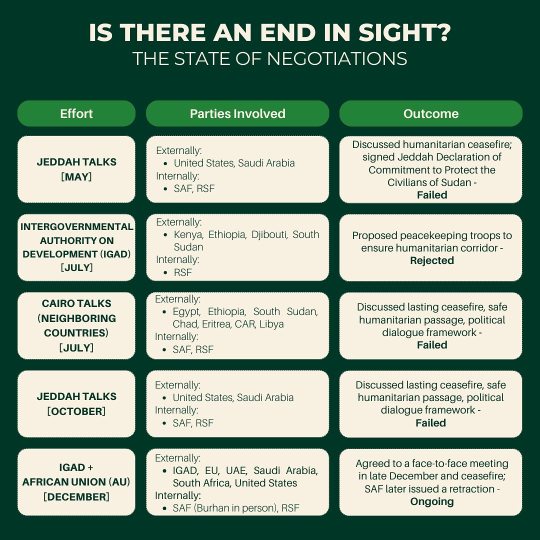
Transcript:
IS THERE AN END IN SIGHT?
THE STATE OF NEGOTIATIONS
Effort: JEDDAH TALKS [MAY]
Parties involved: Externally: United States, Saudi Arabia Internally: SAF, RSF
Outcome: Discussed humanitarian ceasefire; signed Jeddah Declaration of Commitment to Protect the Civilians of Sudan - Failed
Effort: INTERGOVERNMENTAL AUTHORITY ON DEVELOPMENT (IGAD) [JULY]
Parties Involved: Externally: Kenya, Ethiopia, Djibouti, South Sudan Internally: RSF
Outcome: Proposed peacekeeping troops to ensure humanitarian corridor - Rejected
Effort: CAIRO TALKS (NEIGHBORING COUNTRIES) [JULY]
Parties Involved: Externally: Egypt, Ethiopia, South Sudan, Chad, Eritrea, CAR, Libya Internally: SAF, RSF
Outcome: Discussed lasting ceasefire, safe humanitarian passage, political dialogue framework - Failed
Effort: JEDDAH TALKS [OCTOBER]
Parties Involved: Externally: United States, Saudi Arabia Internally: SAF, RSF
Outcome: Discussed lasting ceasefire, safe humanitarian passage, political dialogue framework - Failed
Effort: IGAD + AFRICAN UNION (AU) [DECEMBER]
Parties Involved: Externally: IGAD, EU, UAE, Saudi Arabia, South Africa, United States Internally: SAF (Burhan in person), RSF
Outcome: Agreed to a face-to-face meeting in late December and ceasefire; SAF later issued a retraction - Ongoing
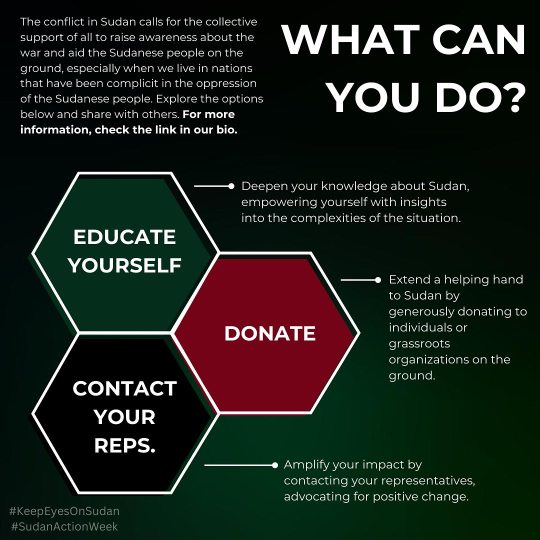
Transcript:
The conflict in Sudan calls for the collective support of all to raise awareness about the war and aid the Sudanese people on the ground, especially when we live in nations that have been complicit in the oppression of the Sudanese people. Explore the options below and share with others. For more information, check the link in our bio.
WHAT CAN YOU DO?
EDUCATE YOURSELF
Deepen your knowledge about Sudan, empowering yourself with insights into the complexities of the situation.
DONATE
Extend a helping hand to Sudan by generously donating to individuals or grassroots organizations on the ground.
CONTACT YOUR REPS.
Amplify your impact by contacting your representatives, advocating for positive change.
#sudan#keep eyes on sudan#KeepEyesOnSudan#Sudan Action Week#SudanActionWeek#i hope the way i formatted it is good#i saw a few hours ago that rsf retreated from wad madani outskirts
368 notes
·
View notes
Text
Let's talk about Sudan-
TRANSCRIPT UNDER CUT

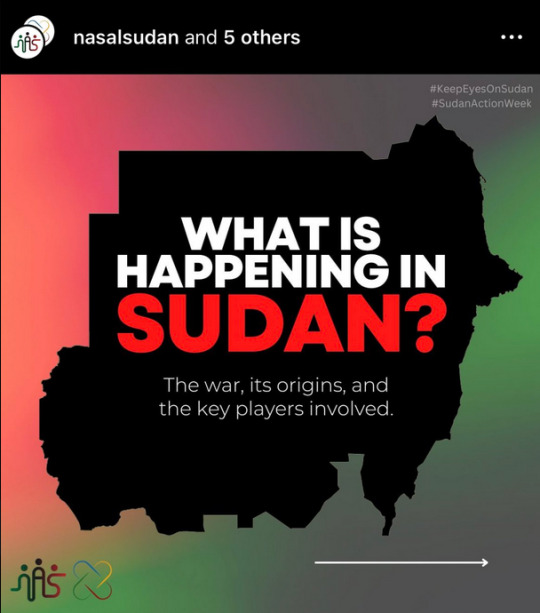
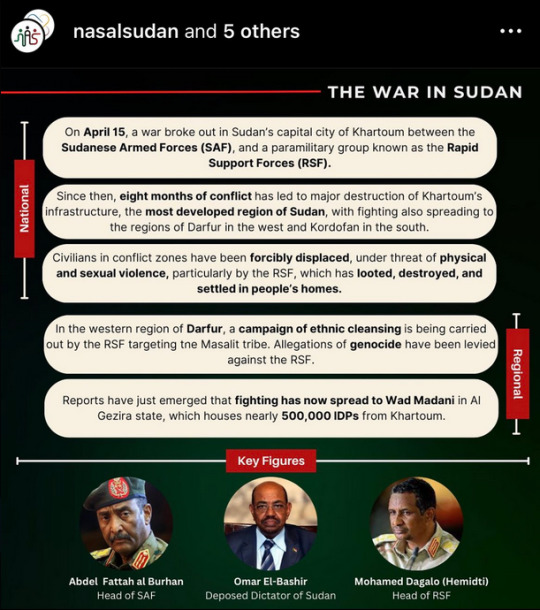
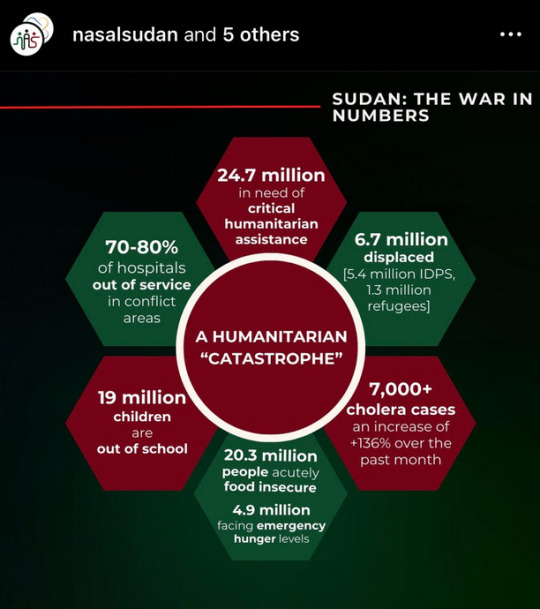

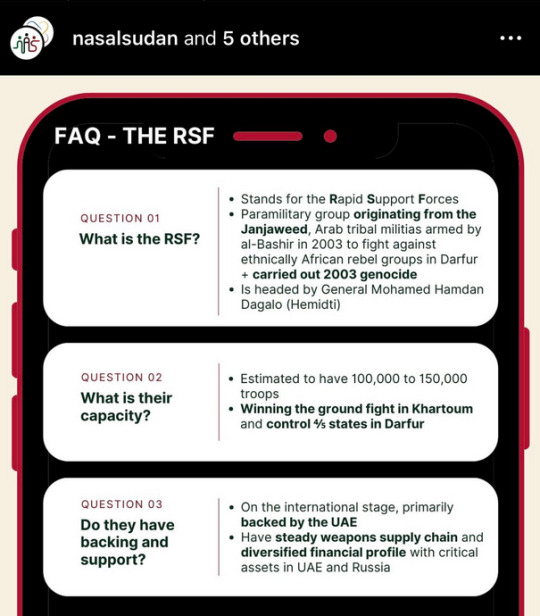
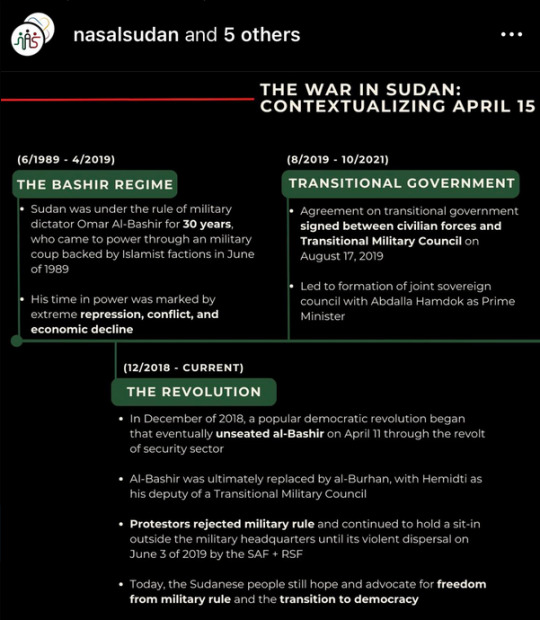
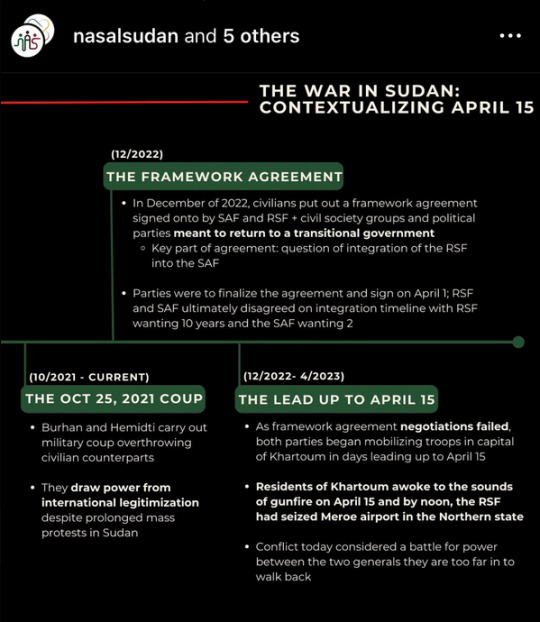
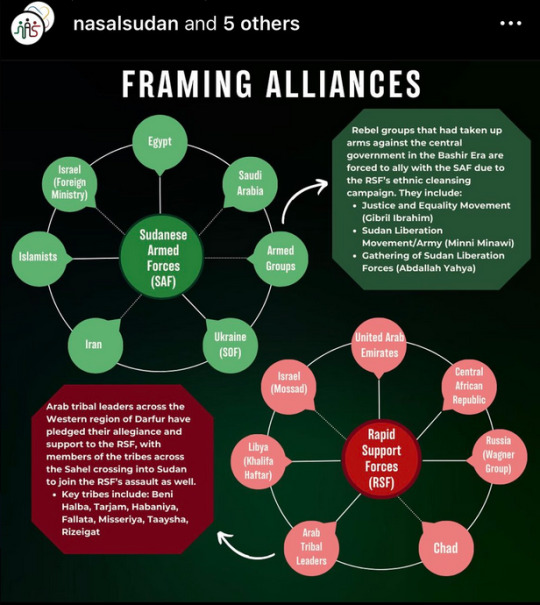
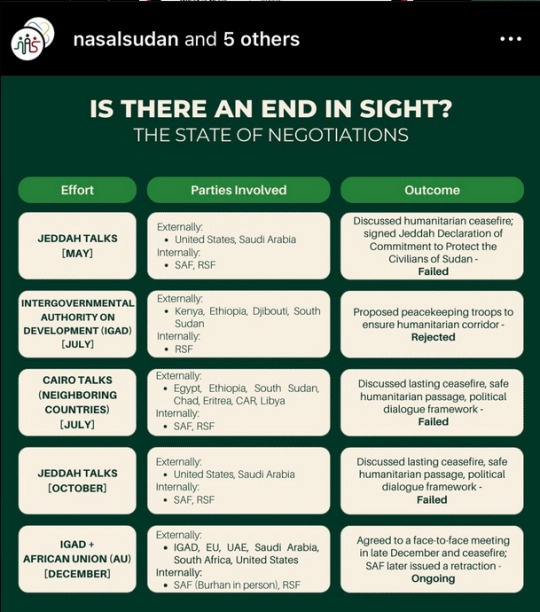
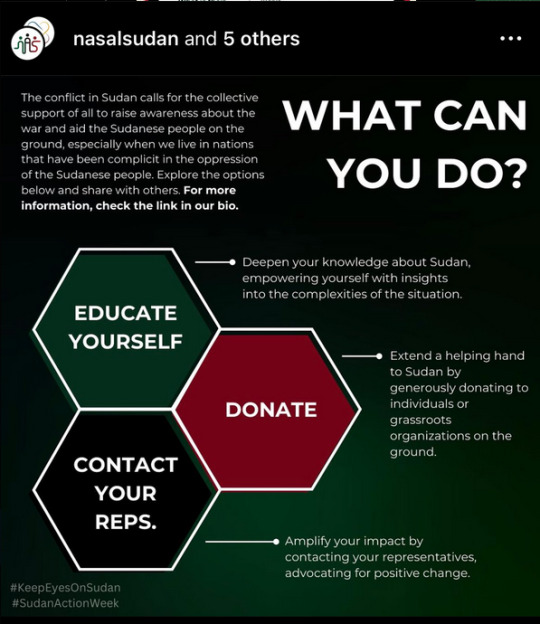
Transcript:
What is happening in Sudan?
The war, its origins, and the key players involved.
The war in Sudan
On April 15, a war broke out in Sudan's capital city of Khartoum between the Sudanese Armed Forces (SAF), and a paramilitary group known as the Rapid Support Forces (RSF).
Since then, eight months of conflict has led to major destruction of Khartoum's infrastructure, the most developed region of Sudan, with fighting also spreading to the regions of Darfur in the west and Kordofan in the south.
Civilians in conflict zones have been forcibly displaced, under threat of physical and sexual violence, particulary by the RSF, which has looted, destroyed, and settled in people's homes.
In the western region of Darfur, a campaign of ethnic cleansing is being carried out by the RSF targeting the Masalit tribe. Allegations of genocide have been levied against the RSF.
Reports have just emerged that fighting has now spread to Wad Madani in AI Gazira state, which houses nearly 500,00 IDPs from Khartoum.
Key Figures: Abdel Fattah al Burhan (head of SAF), Omar El-Bashir (deposed dictator of Sudan), Mohamed Dagalo (Hemidti) (head of RSF)
Sudan: the war in numbers
24.7 million in need of critical humanitarian assistance
6.7 million displaced [5.4 million IDPS, 1.3 million refugees]
7,000+ cholera cases an increase of +136% over the past month
20.3 million people acutely food insecure- 4.9 million facing emergency hunger levels
19 million children are out of school
70-80% of hospitals out of service in conflict areas
FAQ - THE SAF
What is the SAF?
stands fro the Sudanese Armed Forces
is the de-facto government of Sudan
is headed by Lt. General Abdel Fattah al-Burhan
What is their capacity?
estimated to have aprox. 200,000 personnel and tactical advantage of airforce
currently control of relative northern and eastern regions of Sudan with functioning capital in Port Sudan (East)
Do they have backing and support?
on the international stage, primarily backed by Egypt
limited weapons supply from allies
internally, the SAF is ultimately considered the lesser of two evils
FAQ - THE RSF
What is the RSF?
stands fro Rapid Support Forces
paramilitary group originating from the Janjaweed, Arab tribal militias armed by al-Bashir in 2003 to fight against ethnically African rebel groups in Darfur + carried out 2003 genocide
is headed by General Mohamed Hamdan Dagalo (Hemidti)
What is their capacity?
estimated to have 100,000 to 150,000 troops
winning the ground fight in Khartoum and control 4/5 states in Darfur
Do they have backing and support?
on the international stage, primarily backed by the UAE
have steady weapons supply chain and diversified financial profile with critical assets in UAE and Russia
The war in Sudan: contextualizing April 15
6/1989 - 4/2019 - The Bashir Regime
Sudan was under the rule of military dictator Omar Al-Bashir for 30 years, who came to power through an military coup backed by Islamist factions in June of 1989
His time in power was marked by extreme repression, conflict, and economic decline
12/2018 - current - The revolution
In December of 2018, a popular democratic revolution began taht eventually unseated al-Bashir on April 11 through the revolt of security sector
Al-Bashir was ultimately replaced by al-Burhan, with Hemidti as his deputy of a Transitional Military Council
Protestors rejected military rule and continued to hold a sit-in outside the military headquarters until its violent dispersal on June 3 of 2019 by the SAF + RSF
Today, the Sudanese people still hope and advocate for freedom from the military rule and the transition to democracy
8/2019 - 10/2021 - Transitional Government
Agreement on transitional government signed between civilian forces and Transitional Military Council on August 17, 2019
Led to formation to joint sovereign council with Abdalla Hamdok as Prime Minister
10/2021 - Current - The Oct 25, 2021 Coup
Burhan and Hemidti carry out military coup overthrowing civilian counterparts
They draw power from international legitimization despite prolonged mass protests in Sudan
12/2022- The Framework Agreement
In December of 2022, civilians put out a framework agreement signed onto by SAF and RSF + civil society groups and political parties meant to return to a transitional government - key part of agreement: question of integration of the RSF into the SAF
Parties were to finalize the agreement and sign on April 1; RSF and SAF ultimately disagreed on the integration timeline with RSF wanting 10 years and the SAF wanting 2
12/2022-4/2023 - The Lead up to April 15
As framework agreement negotiations failed, both parties began mobilizing troops in capital of Khartoum in days leading up to April 15
Residents of Khartoum awoke to the sounds of gunfire on April 15 and by noon, the RSF had seized Meroe airport in the Northern state
Conflict today considered a battle of power between the two generals they are too far in to walk back
Framing alliances
Sudnese Armed Forces (SAF):
Saudi Arabia
armed groups- rebel groups that had taken up arms against the central government in the Bashir Era are forced to ally with the SAF due to the RSF's ethnic cleansing campaign. They include: Justice and Equality Movement (Gibril Ibrahim), Sudan Liberation Movement/Army (Minni Minawi), Gathering of Sudan Liberation Forces (Abdallah Yahya)
Ukraine (SOF)
Iran
Islamists
Israel (Foreign Ministry)
Egypt
Rapid Support Forces (RSF):
United Arab Emirates
Central African Republic
Russia (Wagner Group)
Chad
Arab Tribal Leaders- Arab tribal leaders across the Western region of Darfur have pledged their allegiance and support to the RSF, with members of the tribes across the Sahel crossing into Sudan to join the RSF's assault as well. Key tribes include: Beni Halba, Tarjam, Habaniya, Fallata, Misseriya, Taaysha, Rizeigat
Libya (Khalifa Haftar)
Israel (Mossad)
Is there an end in sight?
The state of negotiations
Effort- Jeddah Talks [May]
Parties Involved- Externally: United States, Saudi Arabia. Internally: SAF, RSF
Outcome: discussed humanitarian ceasefire; signed Jeddah Declaration of Commitment to Protect the Civilians of Sudan- FAILED
Effort- Intergovernmental authority on development (IGAD) [July]
Parties Involved- Externally: Kenya, Ethiopia, Djibouti, South Sudan . Internally: RSF
Outcome: proposed peacekeeping troops to ensure humanitarian corridor-REJECTED
Effort- Cairo talks (neighboring countries) [July]
Parties Involved- Externally: Egypt, Ethiopia, South Sudan, Chad, Eritrea, CAR, Libya. Internally: SAF, RSF
Outcome: discussed lasting ceasefire, safe humanitarian passage, political dialogue framework-FAILED
Effort- Jeddah talks [October]
Parties Involved- Externally: United States, Saudi Arabia . Internally: SAF, RSF
Outcome: discussed lasting ceasefire, safe humanitarian passage, political dialogue framework-FAILED
Effort- IGAD + African Union (AU) [December]
Parties Involved- Externally: IGAD, EU, UAE, Saudi Arabia, South Africa, United States. Internally: SAF (Burhan in person), RSF
Outcome: agreed to face-to-face meeting in late December and ceasefire; SAF later issued a retraction-ONGOING
What can you do?
The conflict in Sudan calls for the collective support of all to raise awareness about war and aid the Sudanese people on the ground, especially when we live in nations that have been complicit in the oppression of the Sudanese people. Explore the potions below and share with others.
Educate yourself- deepen your knowledge about Sudan, empowering yourself with insights into the complexities of the situation.
Donate- extend a helping hand to Sudan by generously donation to individuals or grassroots organizations on the ground.
Contact your reps- amplify your impact by contacting your representatives, avocating for positive change
221 notes
·
View notes
Text
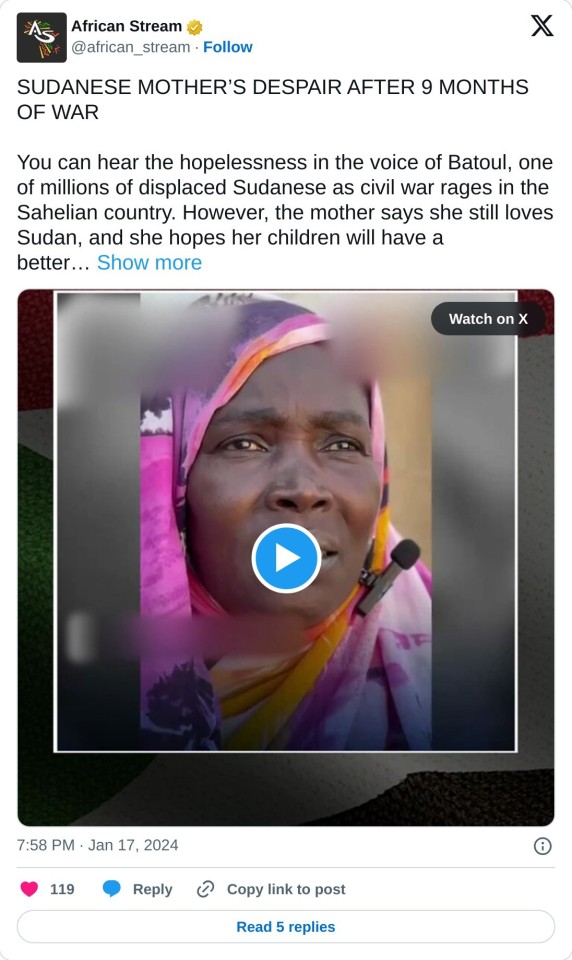
"SUDANESE MOTHER’S DESPAIR AFTER 9 MONTHS OF WAR"
"You can hear the hopelessness in the voice of Batoul, one of millions of displaced Sudanese as civil war rages in the Sahelian country. However, the mother says she still loves Sudan, and she hopes her children will have a better future than the reality to which she has resigned her generation."
"Wad Medani, where Batoul is currently located, emerged as a critical humanitarian hub in April, when fighting broke out between the Sudanese army and the paramilitary Rapid Support Forces (RSF). It hosts hundreds of thousands of internally displaced people escaping the conflict in the capital of Khartoum."
Now in its ninth month, the war has left half of Sudan’s 48 million people requiring aid. According to the United Nations, more than 7.3 million people have fled their homes. Sudan recently bypassed the Democratic Republic of the Congo to take the unfortunate distinction of having the biggest internal displacement crisis in the world."
"Meanwhile, hunger is rising. And, more than 13,000 people have been killed. Plus, the Armed Conflict Location & Event Data Project reports a 56 per cent increase in explosions and remote violence in Khartoum in the weeks between 25 November and 5 January, compared to the six weeks prior. Young boys reportedly have been conscripted as child soldiers, while monitors on the ground say young girls have been forced into prostitution."
"Previous attempts to negotiate an end to fighting have failed. Most recently, Sudan’s government suspended ties with the East African regional bloc, Intergovernmental Authority on Development, because it invited RSF commander Mohamed Hamdan Dagalo (known as ‘Hemedti’) to a 18 January meeting in Uganda."
"As the two sides battle it out, innocent civilians like Batoul are sandwiched in the middle, paying the highest price."
#feminist#feminism#social justice#sudan#eyes on sudan#sudan crisis#sudan genocide#keep eyes on sudan#free sudan#khartoum#violence against women#human rights violations#sudanese#liberate sudan#rsf#genocide#human rights
273 notes
·
View notes
Text
The United Nations food agency warned Sudan’s warring parties Friday that there is a serious risk of widespread starvation and death in Darfur and elsewhere in Sudan if they don’t allow humanitarian aid into the vast western region.
Leni Kinzli, the World Food Program’s regional spokesperson, said at least 1.7 million people in Darfur were experiencing emergency levels of hunger in December, and the number “is expected to be much higher today.”
“Our calls for humanitarian access to conflict hotspots in Sudan have never been more critical,” she told a virtual U.N. press conference from Nairobi.
Sudan plunged into chaos in mid-April 2023, when long-simmering tensions between its military led by Gen. Abdel Fattah Burhan, and the paramilitary Rapid Support Forces commanded by Mohammed Hamdan Dagalo, broke out into street battles in the capital, Khartoum. Fighting has spread to other parts of the country, especially urban areas and the Darfur region.
The paramilitary forces, known as the RSF, have gained control of most of Darfur and are besieging El Fasher, the only capital in Darfur they don’t hold, where some 500,000 civilians had taken refuge.
Kinzli said WFP’s partners on the ground report that the situation in El Fasher is “extremely dire” and it’s difficult for civilians wanting to flee the reported RSF bombings and shelling to leave.
She said the violence in El Fasher and surrounding North Darfur is exacerbating the critical humanitarian needs in the entire Darfur region, where crop production for staple cereals like wheat, sorghum and millet is 78% less than the five-year average.
On top of the impact of escalating violence, Kinzli said, “WFP is concerned that hunger will increase dramatically as the lean season between harvests sets in and people run out of food.”
63 notes
·
View notes
Text
Sudan one of the ‘worst humanitarian disasters in recent memory’, UN warns
The UN says a ‘humanitarian travesty’ is playing out in Sudan amid international inattention and inaction.
Sudan is suffering one of the worst humanitarian crises in recent history after nearly a year of war, the United Nations has warned.
Fighting between the army, headed by General Abdel Fattah al-Burhan, and the paramilitary Rapid Support Forces (RSF), led by Mohamed Hamdan Dagalo, since last April has killed tens of thousands of people, as the threat of famine looms amid international inaction.
“By all measures – the sheer scale of humanitarian needs, the numbers of people displaced and facing hunger – Sudan is one of the worst humanitarian disasters in recent memory,” Edem Wosornu, director of operations at the UN Office for the Coordination for Humanitarian Affairs (OCHA), said on Wednesday.
“A humanitarian travesty is playing out in Sudan under a veil of international inattention and inaction,” Wosornu told the UN Security Council on behalf of OCHA head Martin Griffiths.
“Simply put, we are failing the people of Sudan,” she added, describing the population’s “desperation.”
According to the UN, the conflict has led to more than eight million people being displaced.
In early March, the Security Council called for an immediate ceasefire during Ramadan and urged better access to humanitarian aid. However, the ceasefire was not realised due to disagreements between the warring sides.
More than 18 million Sudanese are facing acute food insecurity – 10 million more than at this time last year – while 730,000 Sudanese children are believed to be suffering from severe malnutrition.
Griffiths warned the Security Council last week that “almost five million people could slip into catastrophic food insecurity in some parts of the country in the coming months”.
[keep reading]
55 notes
·
View notes
Text

Around 1,300 people, mostly civilians belonging to the Massalit tribe, were slaughtered in Sudan’s West Darfur over three days earlier this month by the Rapid Support Forces (RSF) and its allied Arab militias, witnesses, local activists and human rights defenders have told Middle East Eye.
The massacres in Ardamata, an area on the northeast outskirts of West Darfur’s state capital el-Geneina, were committed after the RSF, a paramilitary force, expelled Sudanese soldiers from a military base in the suburb during battles from 2 to 6 November.
For the second time in a matter of months, the streets of el-Geneina and its surroundings have been left filled with corpses.
Witnesses said the scenes were reminiscent of June, when Arab militias and RSF fighters killed more than 500 people in what human rights organizations described as ethnic cleansing against the Massalit, a Black African tribe.
After Sudan’s war broke out on 15 April between the RSF and the Sudanese military, Darfur has been the scene of some of the most ferocious fighting, alongside Khartoum.
Between 2003-2005, Darfur endured a vicious conflict, in which the government of then-president Omar al-Bashir armed thousands of Arab tribesmen, creating a militia known as the Janjaweed, which he used against Darfuri rebel groups that had revolted against Khartoum in response to longstanding neglect of the region’s Black African population.
Around 300,000 people were killed in the war, which is often described as genocidal and brought war crimes charges against several men leading it from the International Criminal Court, as the Janjaweed targeted Darfur’s Black population, driving millions from their homes.
Today, the backbone of the RSF’s paramilitary forces, including its leader, Mohammed Hamdan Dagalo, better known as Hemeti, is made up of Arab tribesmen from Darfur and its surroundings who used to be Janjaweed fighters.
According to Human Rights Watch researcher Mohamed Osman, the Massalit community, as well as other non-Arab communities, have been targeted by the RSF and its allied militias in el-Geneina since June.
Click the link in our bio for more on this story
✍️: MEE/Mohammed Amin
83 notes
·
View notes
Text
On a sunny April afternoon in 2006, thousands of people flocked to the National Mall in Washington, D.C., for a rally with celebrities, Olympic athletes, and rising political stars. Their cause: garner international support to halt a genocide in Sudan’s Darfur region.
“If we care, the world will care. If we act, then the world will follow,” Barack Obama, then the junior Illinois senator, told the crowd, speaking alongside future House Speaker Nancy Pelosi. That same week, then-Sen. Joe Biden introduced a bill in Congress calling on NATO to intervene to halt the genocide in Sudan. “We need to take action on both a military and diplomatic front to end the conflict,” he said.
Flash-forward 18 years, and the prospect of genocide again looms in Sudan amid an explosive new civil war. But this time, there are no rallies, no A-list celebrities, no calls for outside military intervention. Few world leaders pay anything more than lip service to condemning the atrocities.
Fighting between the Sudanese Armed Forces (SAF) and the rival Rapid Support Forces (RSF) paramilitary group has killed tens of thousands of people and displaced some 9 million since the conflict began in April 2023. The United States accused both sides of committing war crimes and atrocities and concluded that the RSF and its allied militias have committed ethnic cleansing.
Western officials and aid workers working on Sudan say they are vexed, and horrified, by the lack of international attention and resources the conflict is receiving—particularly compared to the global response to the conflict in 2006, which was the progenitor of the current conflagration.
If this trend continues and there is no forceful international crisis response, they warn, Sudan will likely collapse into a failed state and could face full-fledged genocide once again.
“You can’t help but watch the level of focus on crises like Gaza and Ukraine and wonder what just 5 percent of that energy could have done in a context like Sudan and how many thousands, tens of thousands of lives it could’ve saved,” said Alan Boswell, an expert on the region at the International Crisis Group.
The top general of the SAF, Gen. Abdel Fattah al-Burhan, and the head of the RSF, Mohamed Hamdan “Hemeti” Dagalo, jointly seized power from a transitional government in a coup in 2021. Tensions between the rival sides escalated and finally erupted into war in April 2023.
In the 13 months since, the RSF has entrenched its positions around the national capital of Khartoum, forcing the SAF to relocate its headquarters to the coastal city of Port Sudan. The RSF has made steady gains in seizing control of Darfur and advancing southward and eastward against SAF forces. The SAF still controls territories around Khartoum and up the Nile River, a vital strategic route to Egypt; along the Red Sea coast; and the eastern borders with Ethiopia and Eritrea.
The conflict has also expanded into a full-fledged regional proxy war. Egypt and Saudi Arabia, as well as Riyadh’s arch regional rival Iran, back the SAF, while the United Arab Emirates is reportedly funneling arms and military supplies to the RSF. The RSF also reportedly receives support from Chad and from Russia through its affiliated mercenary groups.
The focal point of the conflict now is on El Fasher, the capital of North Darfur and the center of fighting. The RSF has taken control of vast swaths of western and southern Sudan in its war against the SAF. El Fasher is the last SAF stronghold in Darfur, occupying a strategically important position for trade routes from neighboring Libya and Chad.
The RSF recently began its advance on El Fasher where an estimated 2 million to 2.8 million civilians have sought to take refuge from the fighting. (Precise figures are hard to come by.)
“The risk of genocide exists in Sudan. It is real, and it is growing every single day,” Alice Nderitu, the U.N. special advisor on the prevention of genocide, warned in a U.N. Security Council meeting last week.
A lengthy report from Human Rights Watch documented how the RSF and allied militias committed widespread atrocities, including mass rape, child murder, and massacres of civilians when it captured the Sudanese city of El Geneina last year. U.S. and U.N. officials and human rights experts warn that the same will likely happen if the RSF takes control of El Fasher, but on a much wider scale. The United States and aid groups have accused the SAF of blocking vital food aid from entering the country and RSF forces of looting humanitarian stocks, exacerbating the crisis and pushing regions of the country closer to famine.
“The potential fatality generation here is off the charts,” said Nathaniel Raymond, executive director of the Humanitarian Research Lab at Yale’s School of Public Health who runs a research project that monitors the conflict in Sudan. “What will happen when the RSF takes El Fasher? Exactly what is happening in every other place they control.”
“There is Hiroshima- and Nagasaki-level casualty potential,” he added, referring to the U.S. atomic bombs dropped on Japan in World War II that killed up to 225,000 people.
Aid organizations and officials who work on Sudan have long decried the relative inattention the conflict in Sudan gets compared to Ukraine or the war in Gaza. Some 20 million people—or 10 times the population of Gaza—are at risk of famine in various regions of Sudan. “Very few people who don’t work on Sudan know that Darfur is on the brink of famine,” Boswell said. “Obviously, everyone knows about the risk of famine in Gaza.”
U.S. President Joe Biden’s own social media posts about Gaza versus Sudan provide another, albeit imperfect, window into the attention each conflict receives. Biden tweeted about Israel or Gaza at least 107 times in the six months since the Oct. 7, 2023, Hamas attacks that started the Israel-Hamas war. Since the war in Sudan began over a year ago, he has tweeted about Sudan four times—three of which were about the evacuation of the U.S. Embassy in Khartoum right after fighting broke out.
Aid groups are strained for resources to tackle the humanitarian crisis caused by the war. In February, Doctors Without Borders warned that in one refugee camp alone in North Darfur, one child was dying every two hours of malnutrition. In April, on the conflict’s first anniversary, aid groups said the international humanitarian response plan to aid the Sudanese was only 6 percent funded. At a donor conference that month in Paris, countries pledged $2 billion more—though that is still only about half of what aid groups estimate the country needs.
Biden appointed a special envoy for Sudan in February—Tom Perriello, a former U.S. representative from Virginia and State Department veteran. Most experts have cheered Perriello’s new push to hold cease-fire talks in the months since and engage U.S. lawmakers on Capitol Hill to bring more levers of U.S. power and financing to bear on Sudan, but they also fear his efforts may be too little, too late for the civilians trapped in El Fasher.
“It will be very hard to deescalate the situation, though everyone should try. But there is an aura of inevitability that this is all going to blow up,” Boswell said. “The degree of mobilization from all sides is hard to walk down.”
Diplomatic and aid officials working on Sudan have some theories on why the atrocities in Darfur and across the country are receiving such little attention now compared to the 2000s, but none gives a full answer.
In 2006, the United States was still reaching the heights of its post-9/11 “war on terror” campaign. Sudan, under former dictator Omar al-Bashir, had given safe haven to Osama bin Laden as he built up al Qaeda’s global terror network, and “bashing Bashir and his genocide in Darfur couched nicely with [counterterrorism] priorities” of the U.S. government at the time, said Nicole Widdersheim, a former senior National Security Council official now with Human Rights Watch.
The memories of failed and successful international interventions to halt genocide—Rwanda in 1994 and the Balkans later that decade, respectively—were still relatively fresh in the minds of policymakers. The costly Western campaigns in Afghanistan, Iraq, and Libya that later exposed the shortcomings and blowback of military interventions were still underway.
It also preceded the current era of great-power competition, where Washington is intensely focused on countering Russia and China. Sudan also competes with the ongoing wars in Gaza and Ukraine for international attention and humanitarian resources. Others suggested racism built into Western foreign policy played a part. “It’s seen as yet ‘another war in Africa like all the others,’” said one official dryly. Not one single factor can explain it all, experts concluded.
“Gaza is taking up the always limited American public interest and activism on a foreign crisis, but to be fair, there was nearly no public activism or engagement on the Sudan war before” the Israel-Hamas war, Widdersheim said.
Experts say the relative inattention Sudan has gotten from the top echelons of the White House and other Western powers that could have influence in pressuring the warring sides in Sudan to sit for peace talks has led to the current protracted state of the war.
Biden hosted Kenyan President William Ruto for a state visit this week, where the two called on “the warring parties in Sudan to facilitate unhindered humanitarian access and immediately commit to a ceasefire” toward the end of a lengthy joint statement but did not elaborate further. U.S. Agency for International Development Administrator Samantha Power and U.S. Ambassador to the United Nations Linda Thomas Greenfield have also been outspoken about urging an end to the conflict in Sudan.
Successive cease-fire talks in Jeddah, Saudi Arabia, over the past year, brokered by the United States and Saudi Arabia, failed to clinch any lasting deal. Those talks were led on the U.S. side not by a top White House official or Secretary of State Antony Blinken, but by the assistant secretary of state for African affairs, Molly Phee.
Behind-the-scenes efforts by some members of Congress in December 2023 to appoint a special presidential envoy on Sudan—one who would report directly to the White House, rather than an envoy reporting to the assistant secretary of state—were unsuccessful, multiple officials and congressional aides said, speaking on condition of anonymity to discuss internal administration dynamics. Perriello was appointed two months later.
Perriello in mid-April said that cease-fire talks would resume in Jeddah “within the next three weeks,” but so far those talks have yet to materialize. Several current and former officials familiar with the matter, who spoke on condition of anonymity to speak candidly, said the talks in Jeddah could resume in June, by which point the RSF could have already captured El Fasher from the mostly cutoff SAF forces.
“The need to start formal peace talks in Jeddah is absolutely urgent, and the United States is working exhaustively with partners to make that happen,” said a State Department spokesperson. “But we are not waiting for formal talks to begin—rather, we have accelerated our diplomatic engagements to align international efforts to end this war, mitigate the humanitarian crisis, and prevent future atrocities.”
Cease-fire talks have worked in limited ways in the past, such as when the United States got both sides to briefly stop fighting in Khartoum so it could evacuate its embassy in April 2023. “When the right leverage is put on the table at the right time to get the RSF and SAF to stop fighting, it can be done,” said Kholood Khair, a Sudanese policy analyst and founding director of Confluence Advisory, a Sudan-focused think tank. “The international community has just chosen not to deploy that same leverage this time around.”
Khair added that the Jeddah talks format has failed before, and it will likely fail again. “The concern is that because of the laziness and complicity of the international community at this point, you don’t have any diplomats who are looking for a new way of doing things. Jeddah in many ways is blocking the start of any new diplomatic efforts or other good ideas that could be effective.”
“Diplomats are fixated on Jeddah now, simply because it’s already there,” Khair said.
As Perriello engaged in frenetic diplomacy, he has also publicly marveled at how little attention the scale of the conflict and death in Sudan is receiving on the international stage.
“One of the things that to me captures just how invisible and horrific this war is, is that we don’t have a credible death count,” Perriello said during a congressional hearing in front of the 21-member Senate Foreign Relations Committee this month. “We literally don’t know how many people have died—possibly to a factor of 10 or 15. The number was earlier 15,000 to 30,000. Some think it’s at 150,000,” he said. During the course of Perriello’s hearing, senators cycled out of the room due to scheduling conflicts, often leaving only one senator in the room and 20 empty seats.
18 notes
·
View notes
Text
sudan's warring generals agreed to hold a face-to-face meeting as part of efforts to establish a cease-fire and initiate political talks to end the country's devastating war, an african regional bloc said sunday. sudan slipped into chaos after soaring tensions between military chief gen. abdel-fattah burhan and gen. mohammed hamdan dagalo, commander of the paramilitary rapid support forces, exploded into open fighting in mid-april in the capital, khartoum, and elsewhere across the country" — via AP News
20 notes
·
View notes
Text
A genocide may have been committed in the West Darfur city of El Geneina in one of the worst atrocities of the year-long Sudanese civil war, according to a report released by Human Rights Watch (HRW).
It says ethnic cleansing and crimes against humanity have been committed against ethnic Massalit and non-Arab communities in the city by the paramilitary Rapid Support Forces and its Arab allies.
The report calls for sanctions against those responsible for the atrocities, including the RSF leader, Mohammed Hamdan Dagalo, widely known as Hemedti.
The UN says about 15,000 people are feared to have been killed in El Geneina last year.
Warning: This article contains details that some readers may find distressing
The HRW report documents evidence of a systematic campaign by the RSF and allied militias to remove Massalit residents from El Geneina.
Witnesses described how the RSF rounded up and shot men, women and children who attempted to escape the ethnic violence in the restive city.
At least "thousands of people" were killed and "hundreds of thousands" left as refugees between April and November 2023, the 218-page report said.
"The events are among the worst atrocities against civilians so far in the current conflict in Sudan," it added.
The US and the prosecutor for the International Criminal Court have talked about war crimes in Darfur but they have not specifically mentioned genocide.
The BBC has spoken to people from El Geneina who say they were victims of ethnic violence.
One man told us he had joined others who fled to a central gathering place after sites were attacked in different parts of the city. He said the RSF had a base nearby and eventually began bombing this area, Mudaris, with heavy guns.
“We buried all the dead people at night,” he said, “one day 186 people, another day 80, another day 50.”
The man, who asked not to be named, is now sheltering in neighbouring Chad.
He told the BBC that armed men raped his wife, using degrading language as they did so: “They said: 'Now we are your husband, your people have all have been killed. You can be the servants of our wives and clean our houses.'”
The HRW report says that RSF fighters and militias used derogatory racial slurs against Massalit and other racial groups, telling them that the land was not theirs and that that it would become "the land of the Arabs".
It says the attacks culminated in a large-scale massacre on 15 June last year, when the RSF and its allies opened fire on a convoy of civilians desperately trying to flee.
A 17-year-old boy described to HRW the killing of 12 children and 5 adults from several families: “Two RSF forces … grabb[ed] the children from their parents and, as the parents started screaming, two other RSF forces shot the parents, killing them. Then they piled up the children and shot them. They threw their bodies into the river and their belongings in after them.”
The current violence has erupted out of a long history of tensions over resources between non-Arab farming communities, including the Massalit, and Arab pastoralist communities.
Those tensions were harnessed by the former government of Omar al Bashir. It created Arab militias known as the Janjaweed to put down a Massalit rebellion in the 2000s, out of which the RSF was eventually formed. Many of the people who fled Janjaweed attacks 20 years ago found refuge in camps for internally displaced persons in El Geneina.
Sudan’s civil war has helped reignite the violence. It began as a power struggle between the leaders of the Sudanese army, General Abdel Fattah al-Burhan, and the paramilitary RSF, Gen Hemedti, but has since drawn in other ethnic militias.
Gen Hemedti has denied his fighters deliberately attacked civilians.
But HRW says he is among those with command responsibility over the forces which carried out the atrocities.
The HRW researchers interviewed more than 220 Sudanese refugees in Chad, Uganda, Kenya, and South Sudan, as well as remotely between June 2023 and April 2024.
They also reviewed and analysed over 120 photos and videos of the events, satellite imagery, and documents shared by humanitarian organisations to corroborate accounts of the abuses.
The rights body called for further investigations to find out if there was an intention to eliminate the Massalit community, which would indicate a genocide.
Last June, West Darfur Governor Khamis Abakar was killed hours after accusing RSF of committing genocide. He is the most senior official known to have been killed since the conflict began in April.
The RSF says it is not involved in what it describes as a "tribal conflict" in Darfur.
8 notes
·
View notes
Text

1-UAE!!
Under the guise of saving refugees, the United Arab Emirates is running an elaborate covert operation to back one side in Sudan’s spiraling war supplying powerful weapons and drones, treating injured fighters and airlifting the most serious cases to one of its military hospitals, according to a dozen current and former officials from the United States, Europe and several African countries.
The operation is based at an airfield and a hospital in a remote town across the Sudanese border in Chad, where cargo planes from the Emirates have been landing on a near-daily basis since June, according to satellite imagery and the officials, who spoke on the basis of anonymity to discuss sensitive intelligence.
Despite strained Sudan-UАЕ relations, gold shipments flowed freely from Sudan to Dubаi, with exports facing no obstacles and operating with official approval in Port Sudan. Political tensions didn't disrupt the lucrative trade, which continued despite the December 2023 expulsion of diplomats and accusations of smuggling.
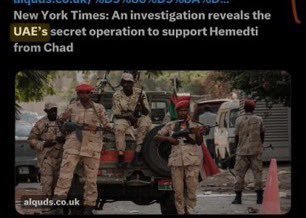
2- Russia (Wagner group)
The Russian mercenary group Wagner has been supplying Sudan’s Rapid Support Forces with missiles to aid their fight against the country’s army, Sudanese and regional diplomatic sources have told the CNN.
The sources said the surface-to-air missiles have significantly buttressed RSF paramilitary fighters and their leader Mohamed Hamdan Dagalo as he battles for power with Gen. Abdel Fattah al-Burhan, Sudan’s military ruler and the head of its armed forces.
(Reports years ago claimed the hemedti smuggles gold to Russia)
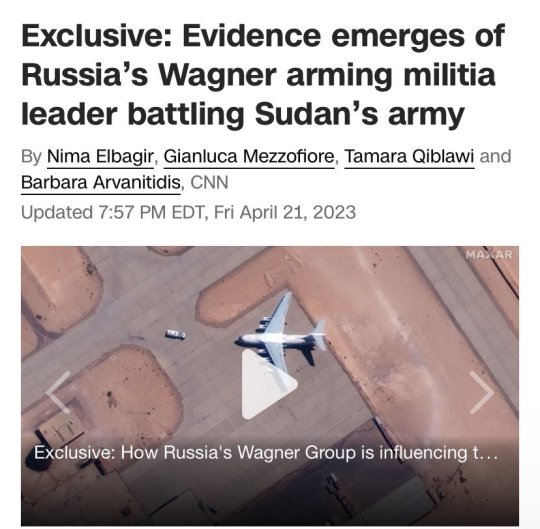
3- Libya
The eastern Libya strongman, Libyan National Army (LNA) commander Khalifah Haftar, has actively backed the paramilitary Rapid Support Forces (RSF) against the Sudanese military and armed forces in the ongoing fighting in Khartoum and its surrounding environs.
Haftar calculates that an RSF victory in the Sudan power struggle would secure valuable trade and smuggling routes through Sudan.
By supporting the RSF, Haftar is aligned with the United Arab Emirates (UAE) and the Russian mercenary Wagner Group.
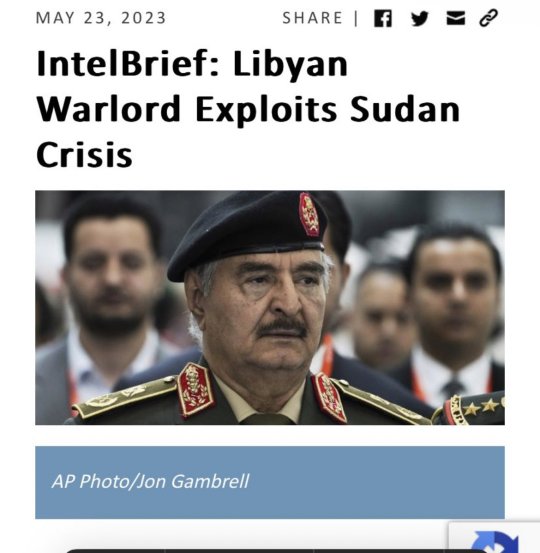
4- Chad
Chadian sources said that the Chadian transitional government is building a new military base or depot 6-7 kilometers north of the city of Abéché in Wadaday state, with full funding from the UAE to support the Rapid Support Militia.
Mobilization campaigns and movements are now underway to prevent this criminal operation carried out by the Chadian government against citizens, with funding from the UAE, to destroy Sudan.
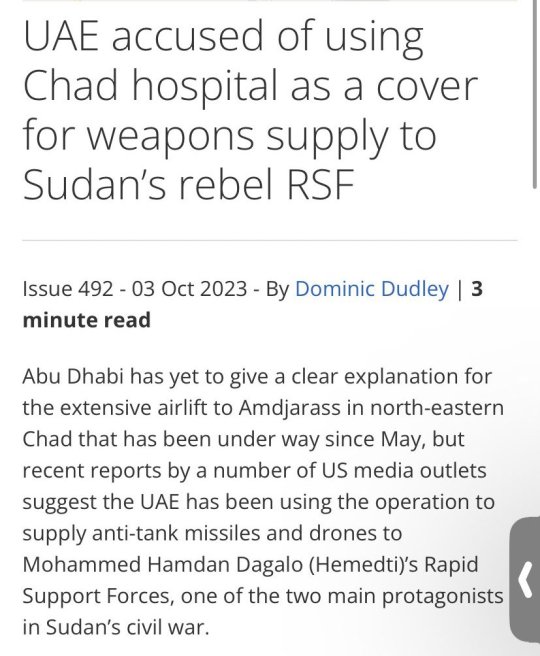
5- Ukraine
In September 2023, CNN reported that Ukrainian special services were behind a series of drone strikes and a ground operation near Sudan's capital, Khartoum, which targeted Rapid Support Forces (RSF), a militia backed by the Wagner Group, a Russian mercenary outfit.
6- Israel
There has been evidence that Israel is also sending supplies to the RSF. Israel wants to curb Iran's expanding influence in the region, while halting human and arms smuggling routes from Sudan to Gaza. Better relations with Sudan would also enhance Israel's ties with other African countries, helping it to gain access to African markets, especially after the suspension of Israel's observer status in the African Union.
Also using Sudan’s war for cheap propaganda and diverting attention from their atrocities in Gaza by claiming that Hamas Is tied to the RSF. Hemedti tried to organize a secret meeting with officials from the Israeli Mossad without the knowledge of the government and the Sudanese army in Khartoum,on January 2022, but he was forced to inform the army of the meeting in the end, after Israel announced.
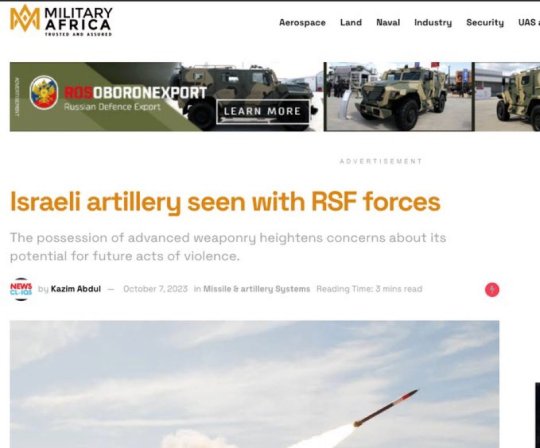
7- Iran
Media reports said Iran has supplied Sudan's army with combat drones. The army has not denied the claims. Later, Sudan's Foreign Minister visited Tehran and held talks with high ranking officials as part of the two countries' efforts to restore their diplomatic relations.
8-The EU
The European Union has been accused of "hiding" the impact of its funding of the Sudanese government and its paramilitary forces as part of a programme to stem the flow of migrants from Africa to Europe. Though the EU claims it provides no funding to the government, activists and researchers say otherwise, arguing the organisation's migration initiatives also benefit, at least indirectly, the country's notorious Rapid Support Forces (RSF) paramilitary group.

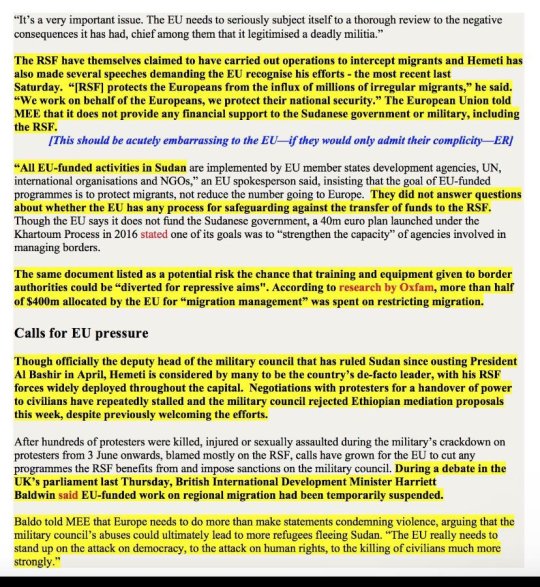
9- The US
During the transitional period, there were long bread lines, and sometimes people had to wait for days to get gas. And that could have been avoided if:
1) The U.S was quicker in getting Sudan off the state sponsor of terror list which blocked it from much of the global economy. It was particularly insulting that they demanded that the only way to do that was to 'normalise' relations with Israel.
2) If the U.S wasn't insisting that the government (which arose because the Sudanese people overthrew Bashir's regime) pay reparations to the U.S for an attack that they had nothing to do with.
3) If the IMF didn't force Sudan to cut fuel and bread subsidies to get debt relief after Bashir's overthrow. One of the triggers for the 2018 revolution was that Bashir was also forced to do this. It made life miserable.
10- Saudi Arabia
The Saudis and Emiratis have turned to battle-hardened forces from Sudan with combat experience in Darfur and other parts of their country. In fact, 8,000-14,000 Sudanese mercenaries including child soldiers between the ages of 13 and 17.
Many of the Sudanese fighters in Yemen come from the Janjaweed (armed horsemen) RSF militias made up of ethnic Arabs from western Sudan, eastern Chad, and the Central African Republic (CAR).
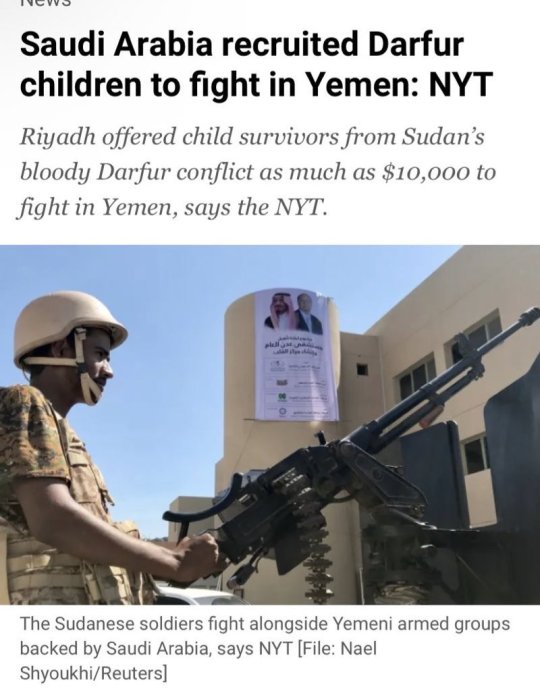

#sudan#rsf#rapid support forces#uae#united arab emirates#russia#wagner group#libya#chad#ukraine#israel#iran#european union#united states#saudi arabia#genocide
9 notes
·
View notes
Text
In brief
The Sudan Armed Forces yesterday carried out airstrikes in Nyala, South Darfur, allegedly with barrel bombs, killing and wounding several people.
Organizers of the recent Cairo humanitarian conference have released a report on the outcomes and recommendations of the conference.
Following the recent IGAD summit, representatives of East African countries, the European Union, and other stakeholders held a meeting in New York, organized by the German and French UN missions, to discuss building on the outcomes of the IGAD summit. Annette Weber, the EU Special Representative for the Horn of Africa, shared this image of the meeting, referring to the recent IGAD summit as “encouraging” and saying the New York meeting aimed to unify efforts for peace.
Similarly, the UN Secretary-General issued a statement welcoming “encouraging developments” at the recent IGAD summit. However, he said he was “gravely concerned by the unwillingness of the parties—so far—to cease hostilities.” The summit, held in Djibouti, marked the first public engagement of the secretary-general's new Sudan envoy, former Algerian Foreign Minister Ramtane Lamamra.
RSF, through its media team, issued a statement yesterday reiterating its “unwavering commitment” to participate in a proposed one-on-one summit between General Abdel Fattah al-Burhan and the RSF Commander, General Mohamed Hamdan Dagalo, facilitated by IGAD. The statement came in the context of rumors that RSF would send its deputy commander to the meeting instead. RSF said these were false rumors spread by its enemies.
In West Darfur, humanitarian organizations carried out a cross-border operation from Chad to deliver health and nutrition supplies to Kulbus and Jabal Moon localities to cover the needs of around 50,000 people, according to the UN Office for the Coordination of Humanitarian Affairs.
Health organizations continue to grapple with outbreaks of measles, cholera, and dengue fever. Health services are non-existent in some areas affected by conflict. OCHA noted, “Attacks on health services and looting of supplies in transit as well as warehouses present a major challenge for continuity of operations.”
11 notes
·
View notes